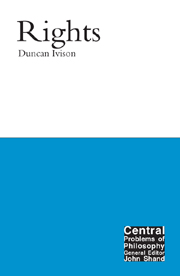7 - Rights as conduits
Summary
Coercion is natural. Freedom is artificial.
(Menand 1996: 1)Introduction
So far we have seen how rights are used to mark the moral status or standing of agents in various ways. We have also explored how they can be understood as instruments to promote certain goals, whether “utility”, equality of resources or welfare. But they can also, I shall argue, be understood as conduits, that is, as modes for distributing capabilities and forms of power and influence and thus shaping behaviour as much as constraining it. The key idea here is that rights are often implicated in various relations of power as much as they are a means of criticizing them. Part of this is due to the fact that if rights are to be enforceable, even in principle, then they require infrastructure: laws, rules, effective social norms, bureaucracies; all manner of institutions. Even negative rights require positive enforcement. So rights are implicated in relations of power not only because power must be exercised to enforce them, or that one can possess all manner of rights (including basic civil and political rights) and still be subject to various forms of power, but also because rights themselves represent a distinctive relation of power. It is this cluster of ideas that I want to explore in more detail in this chapter.
It is important to notice that although there are clear differences between each of these different ways of conceiving of rights – as statuses, instruments and conduits – in any particular instance they will often overlap. The appeal to interests helps us make sense of the complexity and dynamic nature of rights claims, and especially of the particular systems of rights that emerge historically and in different contexts. The appeal to status pushes us towards fundamental principles and conceptions of human agency (and even beyond), and thus towards debates about foundations and the philosophical grounding of rights. Seeing rights as conduits, on the other hand, orients us in the direction of power.
- Type
- Chapter
- Information
- Rights , pp. 180 - 197Publisher: Acumen PublishingPrint publication year: 2007



